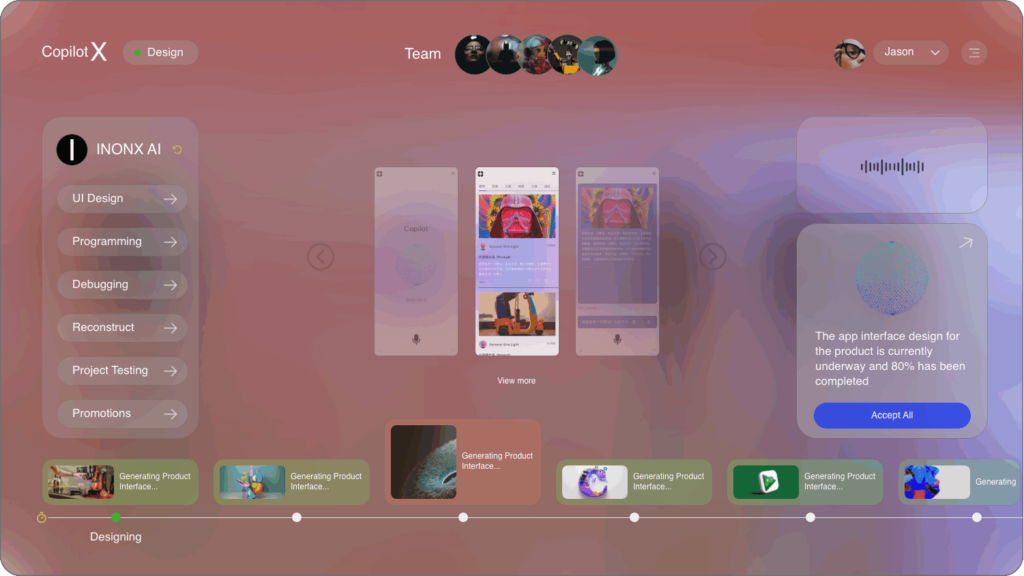The world of artificial intelligence (AI) has continued to evolve at an unprecedented pace, with 2024 ushering in a wave of advancements, tools, and innovative products that cater to various industries. This article discusses the newly released AI large models, the latest tools and APIs, emerging technologies, and transformative products aimed at sectors like healthcare, business automation, education, and cybersecurity, while also highlighting their enhanced functionalities and potential applications.
Recent announcements in AI have seen the launch of Google Gemini 1.5 Pro, a large multimodal model that has set the benchmark for contextual understanding and adaptability across different domains. Gemini 1.5 Pro boasts extended context capabilities, enabling it to understand and generate human-like text while also processing images, videos, and other forms of data. This model is designed to improve knowledge representation frameworks, allowing for more effective organization and retrieval of information. According to Google Research, these advanced features make it particularly useful for industries that require robust data interpretation, such as healthcare, where integrated data types are prevalent (Source: Google Research Blog, 2024).
Following the trend of multimodal AI, several companies are exploring tools that integrate advanced AI with practical applications tailored for specific industries. Among these tools is OpenAI’s ChatGPT API, which integrates recent advancements in unsupervised learning techniques to enhance conversational capabilities across platforms. This API has revolutionized customer service operations in sectors like banking and retail by facilitating seamless, 24/7 interactions that allow businesses to respond quickly to customer inquiries. As a result, companies are experiencing significant improvements in customer satisfaction and operational efficiency (Source: OpenAI, 2024).
In addition to these general tools, innovative AI technologies are emerging that aim to address specialized use cases, particularly concerning the reliability and bias in large language models (LLMs). One notable advancement is the increased focus on training models that reduce harmful biases or misinformation in generated content. This effort is crucial for applications in education, where accuracy and fairness are paramount. Developers are implementing new training datasets and methodologies designed to identify and mitigate biases, leading to the creation of more reliable and debiased LLMs (Source: AI Ethics Journal, 2024).
Furthermore, the introduction of enterprise-focused AI products has been transformative, especially in fields such as cybersecurity and business automation. Companies like Microsoft and IBM have rolled out advanced AI solutions equipped with robust anomaly detection capabilities, utilizing machine learning to identify unusual patterns and behaviors indicative of potential cyber threats. By leveraging LLMs and anomaly detection frameworks, businesses can now manage their cyber environments more proactively and efficiently, responding to threats in real time rather than relying solely on reactive measures (Source: IBM Security Report, 2024).
In the creative industries, AI continues to innovate with products designed to enhance artistic expression and streamline content creation. Adobe’s AI-driven Creative Cloud tools now utilize advanced image and video generation models, allowing users to produce high-quality artwork and media using simple prompts. This functionality empowers creators by automating tedious aspects of the creative process, thus allowing them to focus on their artistic vision while significantly reducing time and effort. The implications for the education sector are equally promising, as educators can leverage AI tools to generate customized learning materials that adapt to the needs and preferences of students (Source: Adobe Creative Cloud, 2024).
Moreover, the exciting integration of AI in planetary exploration showcases its potential in specialized applications. AI-driven planetary rovers are equipped with advanced perception algorithms and real-time decision-making capabilities, allowing them to navigate and collect data from alien landscapes autonomously. These systems employ machine learning techniques to analyze vast amounts of environmental data, making critical decisions comparable to those made by human operators. As space agencies continue to invest in these technologies, the role of AI in expanding the boundaries of human exploration will become increasingly significant (Source: NASA Tech Briefs, 2024).
To support these advancements, the AI landscape is also witnessing the emergence of new platforms and ecosystems geared toward fostering collaboration and innovation. For instance, organizations are developing knowledge representation frameworks that facilitate the sharing and integration of AI solutions across industries. These platforms enable diverse companies to tap into advanced AI technologies, thereby accelerating the adoption and efficacy of AI solutions tailored for unique applications (Source: AI Global Strategies, 2024).
Additionally, ethical considerations remain at the forefront of AI development as companies push for transparency and accountability in their AI systems. Initiatives aimed at establishing industry standards for AI ethics are being led by coalitions of tech companies, academia, and regulators. These efforts focus on creating guidelines that ensure AI technologies are developed and deployed responsibly, thus fostering public trust and acceptance (Source: IEEE Spectrum, 2024).
In summary, the advancements in artificial intelligence in early 2024 are characterized by notable releases like Google Gemini 1.5 Pro, which showcases enhanced multimodal capabilities and context understanding. There is a growing number of tools and APIs that integrate advanced AI for diverse applications, addressing the needs of various industries while aiming toward more reliable technologies. Meanwhile, innovative products in enterprise, cybersecurity, and creative fields are reshaping traditional practices by enhancing functionalities and streamlining workflows. With a vigilant focus on ethical standards and emerging technologies, the road ahead promises to unlock new possibilities for AI applications across sectors, ultimately enhancing our capability to tackle complex challenges and improve quality of life.
References:
1. Google Research Blog. (2024). Google Gemini 1.5 Pro Launch Announcement.
2. OpenAI. (2024). Official Announcement: ChatGPT API Integration.
3. AI Ethics Journal. (2024). New Strategies for Debiasing AI Models.
4. IBM Security Report. (2024). AI in Cybersecurity: A New Frontier.
5. Adobe Creative Cloud. (2024). Innovations in Creative AI Tools.
6. NASA Tech Briefs. (2024). AI and Planetary Exploration: The Role of Robotics.
7. AI Global Strategies. (2024). Collaborative Knowledge Representation Frameworks.
8. IEEE Spectrum. (2024). Ethical AI: Establishing Standards and Best Practices.


























